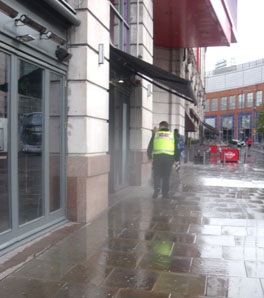Town by town, Britain is going through a profound change in its on-street policing, writes Mark Rowe.
At a different time in each town, but for the same reasons, local government, and a mosaic of parallel bodies are hiring private guard forces to patrol high streets. There is next to no debate about whether Britain ought to have in effect private security doing police tasks, with a fraction of the back-up of the police. Nor are any of the public bodies that have a say in public space and how it’s managed coming forward with policies on how those private guards doing public work should do their job. Nor any informing of the public, to ask if they want such a change. Even if politicians were not consumed by Brexit, civic society has become gravely weakened, and is less able to raise such questions, let alone hold a debate on them.
Privatisation of public policing has not happened, and not at all as soon or as much as propagandists for the sector wished for, for decades. Partly, because there isn’t enough of a market for a relatively niche service. It’s telling that the major guarding companies – G4S, Securitas, Mitie – have not brought out such a national offering. Partly, because it would still cross a bridge of the private security sector intruding on a public sector responsibility, and raise controversy. More practically, those large contractors would rather serve a national retailer, working seven-figure contracts, providing services from CCTV monitoring to alarm response to data analytics of crime to actual deployment of guards (at times and in places according to what the incident data suggests would have most impact). By comparison, providing a pair of guards on a high street here and a main street there in business hours isn’t worth their while.
But over the 2010s, thanks to budget cuts, police have had to temper their historic hostility to private security on their turf, public space. The political backing for police in that sense has gone, as the business improvement districts (BIDs) that hire private security patrollers are a recent invention. Also, again there’s practicality; in each town centre BID area, aggressive beggars, prolific shop thieves, and low-level but regular anti-social behaviour by lunchtime and after-school students can be enough to drive footfall away, adding to troubles for high street retailers struggling to compete with online shopping (where shoppers don’t have to pass beggars in fire exit doorways). As police services have become 999 emergency response, like the Roman Britons after 410, BID and town centre managers and managing agents of shopping centres have had to look to themselves: whether in large cities and small, Liverpool or Salisbury, and whether a town is leafy and low-crime or gritty and high-crime, high streets.
Indeed, the old dilemma of hiring private security does not apply here – that as soon as the problem it’s hired to solve, reported crime, is solved or reduced, the temptation is to cut the security, until the crime rises again, prompting the need to hire security; a cycle. Some shop thieves are local and opportunist; others are organised and travel. To name two high-tourist destinations with CSAS-accredited patrollers, York and Windsor, patrols are there as much for reassurance, to meet and greet, ambassadors, to answer queries and give directions. That’s the traditional role of a ‘bobby on the beat’. Police have instead become blue light fire-fighters. Yet it’s telling that one of the few places, an exception to the rule, where the ‘bobby’ may still apply, central London, still heavily policed on the ground around the Houses of Parliament, and offices of central Government, police may be carrying machine-guns. While police do stress that they are approachable and want to be approached by the public, it’s asking a lot, more than British people want to give, to go up to a man with a gun to ask him the way to the nearest Tube station. And, it has to be said, some at least of the 30 or more police officers when on duty in Trafalgar Square – a morning after the Extinction Rebellion protests – would sip coffee, look at their mobile phones, and talk with their fellows and sit in vehicles; keen to do anything except engage with the public.
Next; who’s to lead the debate on private policing of public spaces, and write the workbook?
Picture by Mark Rowe; October 2019 weekday afternoon, private security officer checking fire doors and walking the perimeter of the Printworks, central Manchester.










